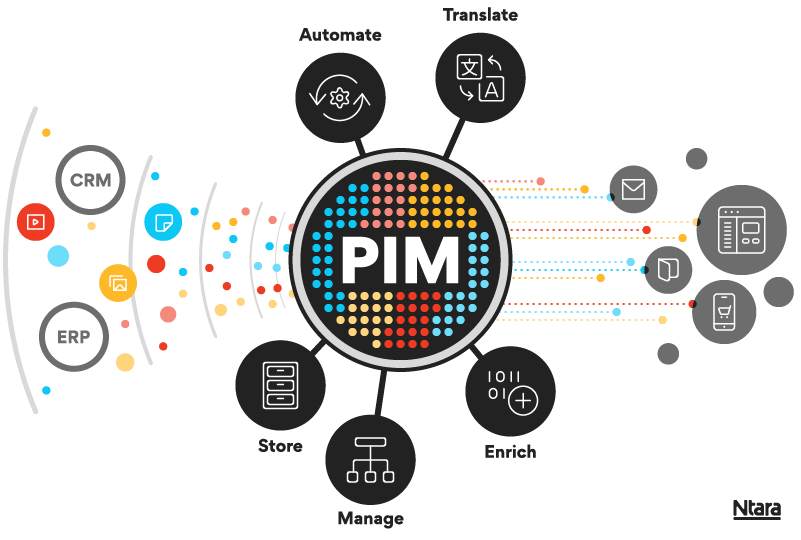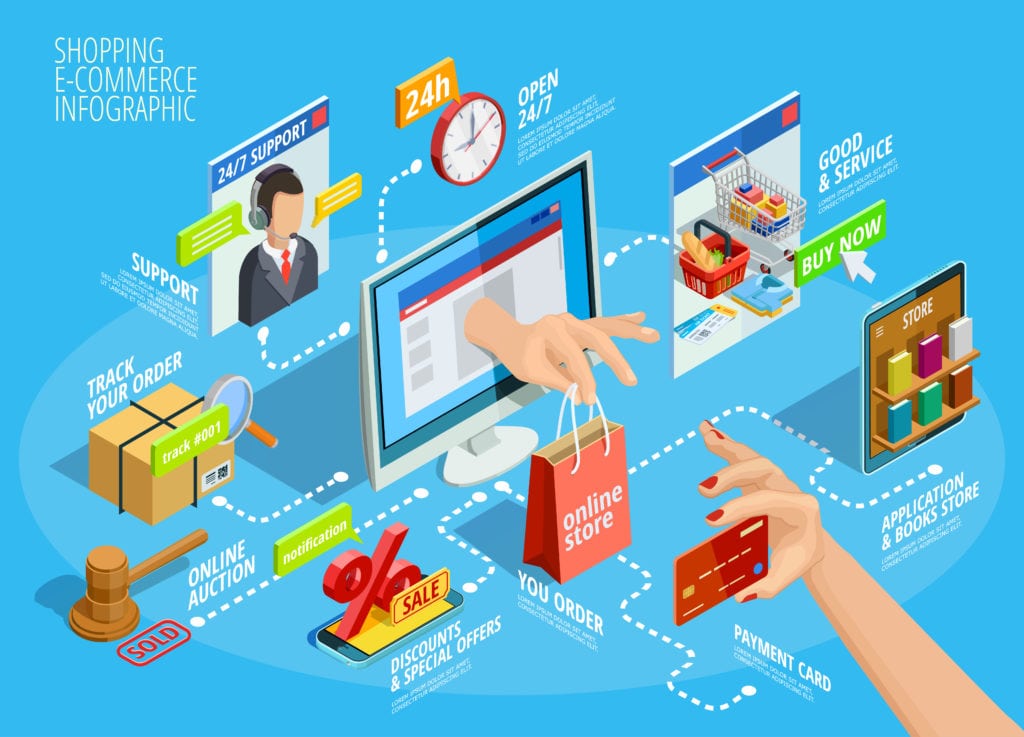- Introduction
- What is Enterprise eCommerce?
- The Benefits of Enterprise eCommerce
- Key Considerations for Enterprise eCommerce Development
- Essential Features for Enterprise eCommerce Platforms
- Building Your Enterprise eCommerce Strategy
- Marketing Your Enterprise eCommerce Store
- Optimizing Your Enterprise eCommerce Operations
- The Future of Enterprise eCommerce
- Conclusion
- Frequently Asked Question (FAQs)
Table of Contents
Enterprise eCommerce 101: The Definitive Guide

Introduction
Enterprise eCommerce represents the pinnacle of online retail for large-scale businesses. It utilizes advanced technologies and strategies to manage vast product catalogs, high-volume sales, and extensive customer bases.
This guide delves into the essentials of enterprise eCommerce, from infrastructure and scalability to complex integrations and personalized customer experiences.
The best enterprise eCommerce platforms enable businesses to optimize operations, enhance security, and maximize revenue by leveraging comprehensive analytics, multi-channel support, and sophisticated supply chain management.
Whether you're expanding an existing enterprise or starting anew, this guide offers the insights needed to thrive in the competitive world of large-scale online retail.
What is Enterprise eCommerce?

Enterprise e-commerce refers to large-scale online retail operations typically managed by big corporations.
It involves advanced features like multi-channel selling, extensive product catalogs, integration with other enterprise systems, and robust infrastructure to handle high traffic and transactions securely and efficiently.
Enterprise eCommerce offers a broader scope and sophistication than its traditional counterpart.
Here, we delve into the distinctions between Enterprise eCommerce and traditional eCommerce, shedding light on the scalability, complexity, and technological requirements that set them apart.
Enterprise eCommerce vs. Traditional eCommerce
At its core, the difference between enterprise eCommerce and traditional eCommerce lies in the scale and intricacy of operations.
- Enterprise eCommerce is designed for large-scale businesses, whereas traditional eCommerce suits small- to medium-sized businesses.
- Enterprise eCommerce handles high traffic and large transaction volumes; traditional eCommerce handles moderate traffic and transaction volumes.
- With enterprise eCommerce development, you will get customizable and scalable solutions, but customization options are limited in traditional eCommerce.
- With robust infrastructure and security measures, enterprise eCommerce platforms can be integrated with other enterprise systems, such as ERP CRM, but traditional eCommerce platforms have limited options.
- With enterprise eCommerce development, you will get a dedicated IT support and management team, but the initial cost will be high. On the other hand, in traditional eCommerce development, the support is limited, and the investment is low, too.
The Benefits of Enterprise eCommerce
Enterprises are increasingly turning to enterprise eCommerce development to harness its array of advantages.
We'll explore how this robust digital commerce approach enhances sales and market reach, operational efficiency, and customer experience, establishing a holistic understanding of its pivotal role in modern business strategies.
Increased Sales and Market Reach

The scalability of enterprise eCommerce platforms empowers businesses to expand their market reach, targeting a broader audience and catering to diverse consumer preferences.
By leveraging advanced analytics and digital marketing tools, enterprises can tailor their sales strategies to reach specific demographics, increasing sales and heightened brand visibility in the competitive online marketplace.
Improved Operational Efficiency
Efficiency is critical in today's fast-paced business landscape, and enterprise eCommerce development is vital in optimizing operational workflows.
By automating mundane tasks, real-time inventory tracking, and integrating existing systems, enterprises can streamline their processes and reduce operational costs.
This enhanced efficiency improves overall productivity and provides the agility needed to adapt to changing market conditions and customer demands swiftly.
Enhanced Customer Experience

In enterprise eCommerce, delivering a superior customer experience is paramount to building a loyal customer base.
Integrating cutting-edge technologies like an enterprise AI chatbot solution for eCommerce enables businesses to offer personalized and responsive customer service around the clock.
From providing instant assistance to offering tailored product recommendations, these solutions in enterprise eCommerce development enhance customer engagement and satisfaction, fostering long-term client relationships and driving repeat business.
Key Considerations for Enterprise eCommerce Development
As organizations continue to embrace the benefits of the best enterprise eCommerce platform, addressing key considerations is crucial when developing an effective digital enterprise eCommerce strategy.
Let's learn about the essential considerations businesses must make when building a scalable eCommerce platform, integrating with existing enterprise systems, and ensuring data security and compliance.
Building a Scalable eCommerce Platform

The best enterprise eCommerce platform is a fundamental requirement for scaling and organizations aiming to expand their digital presence and target new markets.
Selecting the best enterprise eCommerce platform that can accommodate future growth and support agile business operations is critical.
The chosen platform should be flexible enough to address evolving market demands and support advanced functionalities such as personalized customer experiences, marketing automation, and real-time analytics.
Additionally, it's essential to choose a development partner with experience in enterprise eCommerce development, as this ensures relevant platform implementation.
Integrating with Existing Enterprise Systems (ERP, CRM)
Integrating the enterprise eCommerce platform with existing enterprise systems such as ERP and CRM is vital in achieving operational efficiency and optimized workflows.
Integration facilitates automated data processing, order management, inventory tracking, and financial reconciliation, saving time and cost.
To ensure a successful integration, businesses must ensure compatibility between platforms, define precise data mapping, and establish robust data governance policies to prevent data inconsistencies and errors.
Data Security and Compliance

Data Security is critical in enterprise eCommerce development and operations, and in today's regulatory environment, it's vital to ensure compliance with relevant regulations such as PCI DSS, HIPAA, and GDPR.
Businesses should implement robust security protocols such as encryption, two-factor authentication, and data access controls to ensure data security.
Regular security audits and vulnerability scans are essential in identifying and mitigating potential security risks.
Additionally, establishing a data governance framework ensures compliance with regulatory requirements and promotes data privacy and integrity.
Considering all these considerations will ensure your enterprise eCommerce development is on par with international standards.
Essential Features for Enterprise eCommerce Platforms
Having the right features is crucial for achieving success in the digital marketplace when it comes to enterprise eCommerce.
This section will discuss the essential features businesses should consider when selecting the best enterprise eCommerce platform.
Product Information Management (PIM)

A robust Product Information Management (PIM) system efficiently manages product data, attributes, and content.
A comprehensive PIM solution enables businesses to centralize product information, maintain data accuracy, and ensure consistency across all sales channels.
With PIM, businesses can streamline product onboarding processes, improve data quality, and provide customers with accurate and up-to-date product information, enhancing the shopping experience within the enterprise eCommerce platform.
Order Management System (OMS)

An Order Management System (OMS) is a critical component of enterprise eCommerce platforms as it facilitates seamless order processing, inventory management, and fulfillment operations.
OMS allows businesses to efficiently manage orders from multiple sales channels, track order statuses in real time, and optimize order routing and fulfillment processes.
By integrating OMS with enterprise eCommerce development, businesses can automate order processing, reduce fulfillment times, and improve order accuracy, ultimately enhancing customer satisfaction and repeat business.
Customer Relationship Management (CRM) Integration
Integrating Customer Relationship Management (CRM) software with the enterprise eCommerce platform is essential for businesses looking to build and maintain strong customer relationships.
By leveraging CRM data, businesses can personalize marketing campaigns, provide targeted promotions, and deliver tailored customer experiences, fostering customer loyalty and retention.
Marketing Automation Capabilities
Marketing automation capabilities are key features that empower businesses to streamline marketing processes, personalize customer communications, and drive sales growth.
Enterprise eCommerce platforms with built-in marketing automation tools enable businesses to automate email marketing, conduct targeted campaigns, and analyze customer engagement metrics.
Suggested Reading :
How to Implement Enterprise E-Commerce Solutions Successfully
Building Your Enterprise eCommerce Strategy
Crafting a successful enterprise eCommerce development strategy is crucial for businesses looking to thrive in the competitive online marketplace.
By identifying their target audience, developing a competitive product assortment, and creating a user-friendly shopping experience, businesses can enhance their online presence and drive sales growth.
Identifying Your Target Audience

Understanding your target audience is the foundation of a successful enterprise eCommerce strategy.
- Analyze customer demographics, behavior, and preferences to tailor marketing and products.
- Use data analytics tools and customer feedback for insights into preferences and shopping habits.
- Personalize marketing campaigns and product recommendations to drive engagement and increase conversions.
Developing a Competitive Product Assortment
A competitive product assortment attracts and retains customers in the saturated enterprise eCommerce space.
- Offer a diverse range of high-quality products to cater to varying customer needs and preferences.
- Conduct market research and stay informed about industry trends to identify product expansion and differentiation opportunities.
- Leverage data analytics and inventory management systems to optimize product offerings and meet customer demand.
Crafting a User-Friendly Shopping Experience

Creating a user-friendly shopping experience enhances customer satisfaction and encourages repeat business in the enterprise eCommerce development.
- To improve the shopping experience, design a website with intuitive navigation, fast loading times, and secure payment options.
- Utilize enterprise AI chatbot solutions for eCommerce and enhance customer support, personalized recommendations, and streamlined shopping.
- Optimize for mobile responsiveness and provide an efficient checkout process to reduce cart abandonment and increase conversion rates.
Marketing Your Enterprise eCommerce Store

Once you have developed a robust enterprise eCommerce strategy, the next step is to market your online store effectively to reach your target audience.
Businesses can drive website traffic and increase sales by leveraging various digital marketing channels.
This section will explore search engine optimization (SEO) strategies, content marketing and brand storytelling, and leveraging paid advertising channels.
Search Engine Optimization (SEO) Strategies
SEO is critical for businesses looking to improve their organic search engine rankings and drive traffic to their website.
- Optimize the enterprise eCommerce website content with keywords, meta descriptions, and alt tags to improve search engine results pages (SERPs) visibility.
- Create high-quality content, including product descriptions and blog posts, to enhance user experience and encourage website engagement.
- Build backlinks through guest posting, social media, and other strategies to improve domain authority and boost SEO rankings.
Content Marketing and Brand Storytelling
Content marketing and brand storytelling can help businesses create a strong online presence and drive customer loyalty.
- Use blog posts, social media, email campaigns, and other channels to tell the brand's story and engage with the target audience.
- Create high-quality videos and imagery, like product demos and customer testimonials, to convey the brand's message and encourage website engagement.
- Provide valuable, informative content, such as how-to guides and industry insights, to establish the brand as a thought leader and boost customer loyalty.
Leveraging Paid Advertising Channels
Paid advertising channels, such as pay-per-click (PPC) advertising and social media advertising, can help businesses target their audience and drive traffic to their website.
- Create compelling advertisements and target specific demographics and keywords to increase click-through rates and conversions in the enterprise eCommerce platform.
- Use retargeting to show ads to previous site visitors, improving conversion rates and encouraging customer loyalty.
- Leverage the right paid advertising channels and optimize ad campaigns to maximize return on investment and drive sales growth.
Suggested Reading :
10 Tips for Implementing Enterprise E-commerce Successfully
Optimizing Your Enterprise eCommerce Operations
Optimizing your operational processes is crucial to ensuring the success of your enterprise eCommerce store.
From inventory management and fulfillment strategies to customer service excellence and data-driven decision-making, every aspect plays a pivotal role in enhancing your business's overall performance.
Inventory Management and Fulfillment Strategies

Efficient inventory management is the cornerstone of a successful eCommerce operation. It involves strategically controlling the flow of goods from procurement to fulfillment, maximizing sales potential while minimizing carrying costs.
- Utilize an advanced enterprise eCommerce platform for streamlined inventory management with real-time visibility, automated reorder triggers, and efficient order fulfillment.
- Implement robust fulfillment strategies, including third-party logistics and dynamic shipping solutions, to enhance customer satisfaction and retention.
Customer Service and Support Excellence
Delivering exceptional customer service is a defining factor for a thriving enterprise eCommerce business.
The ability to promptly address customer queries, provide personalized support, and resolve issues efficiently builds trust and loyalty.
- Utilize an enterprise AI chatbot solution for eCommerce to automate responses and provide instant customer support.
- Invest in customer service training and establish clear communication channels to enhance service excellence in enterprise eCommerce.
- Automating common inquiries frees up resources, allowing enterprise eCommerce platform operations to focus on more complex service demands.
Analytics and Data-Driven Decision Making

In the dynamic landscape of eCommerce, leveraging analytics and data-driven insights is paramount for making informed decisions.
- Harness data analytics to determine customer behavior, sales patterns, and operational efficiency.
- Identify key performance indicators (KPIs) and use them to derive actionable strategies for new growth opportunities.
- Implement advanced reporting tools in your enterprise eCommerce platform for comprehensive insights to optimize marketing, enhance products, and refine operations.
The Future of Enterprise eCommerce
The future of enterprise eCommerce is poised for transformative advancements driven by emerging technologies and evolving consumer preferences.
From artificial intelligence and personalized experiences to the rise of omnichannel commerce, businesses must adapt and innovate to stay ahead in the competitive digital landscape.
Emerging Technologies: AI, Personalization, AR/VR

As the digital realm continues to evolve, the integration of cutting-edge technologies like artificial intelligence (AI) and augmented reality/virtual reality (AR/VR) presents unparalleled opportunities for enhancing customer experiences and optimizing operational efficiency.
- AI-powered solutions like enterprise AI chatbot solutions for eCommerce and predictive analytics enhance customer interactions with personalized recommendations and streamlined purchase journeys.
- AR/VR technologies provide immersive shopping experiences, allowing customers to visualize products and make informed decisions.
- Embrace these technologies in enterprise eCommerce to drive engagement, build brand loyalty, and accelerate business growth.
Omnichannel Commerce and Unified Customer Journeys
In the era of omnichannel commerce, delivering seamless, integrated customer experiences across multiple touchpoints is paramount for success.
- Unify online and offline channels integrated in the enterprise eCommerce platform helps to create a cohesive customer journey from discovery to purchase.
- Utilize data insights and advanced analytics from enterprise eCommerce platforms to personalize interactions and optimize marketing strategies.
- Implement a holistic omnichannel strategy to enhance customer engagement, foster brand loyalty, and maximize lifetime customer value.
Conclusion
In conclusion, the world of enterprise eCommerce is dynamic and demanding, requiring businesses to scale, innovate, and adapt to stay ahead.
In this blog, we have explored the essential components of a successful enterprise eCommerce strategy, from understanding the unique challenges and benefits to implementing effective marketing, operational, and technological solutions.
By defining target audiences, selecting the right platform, building scalable infrastructures, and integrating with existing systems, you can enhance your market reach, customer experience, and operational efficiency.
AppsRhino offers a comprehensive, secure, and scalable eCommerce platform tailored to meet the needs of growing enterprises.
With powerful features, seamless integrations, and dedicated support, AppsRhino is poised to help businesses thrive in the competitive digital marketplace. Embrace the future of enterprise eCommerce with confidence and drive your business toward unparalleled success.
Suggested Reading :
Launching Your Ecommerce Platform: A Practical How-To Guide
Frequently Asked Question (FAQs)
Can an enterprise eCommerce platform handle a large volume of transactions and products?
Yes, an enterprise eCommerce platform is designed to manage substantial transaction volumes and various products efficiently. Its robust infrastructure and scalable capabilities cater to the demands of enterprise-level operations.
What are the key features to look for in the best enterprise eCommerce platform?
Key features include advanced inventory management, flexible order fulfillment options, robust data analytics, customizable customer experiences, seamless integration with third-party systems, and scalable architecture to support future growth.
How can AI chatbot solutions enhance customer support in enterprise eCommerce?
AI chatbots can respond instantly to customer inquiries, automate order tracking, offer personalized product recommendations, and streamline the support process, resulting in enhanced customer satisfaction and operational efficiency.
What impact does personalization have on enterprise eCommerce success?
Personalization fosters deeper customer engagement, increases conversions, and cultivates brand loyalty.
Businesses can significantly enhance their bottom line by tailoring product recommendations, marketing messages, and the overall shopping experience.
Why is omnichannel commerce essential for enterprise eCommerce?
Omnichannel commerce ensures a seamless and unified customer experience across all touchpoints, leveraging online and offline channels.
This approach enhances customer satisfaction, strengthens brand loyalty, and drives overall revenue growth.
Table of Contents
- Introduction
- What is Enterprise eCommerce?
- The Benefits of Enterprise eCommerce
- Key Considerations for Enterprise eCommerce Development
- Essential Features for Enterprise eCommerce Platforms
- Building Your Enterprise eCommerce Strategy
- Marketing Your Enterprise eCommerce Store
- Optimizing Your Enterprise eCommerce Operations
- The Future of Enterprise eCommerce
- Conclusion
- Frequently Asked Question (FAQs)


